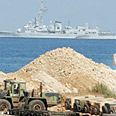
Lebanon: Israel ends blockade
Government officially announces sea blockade of Lebanon has been lifted; Lebanon says Israeli gunships sail home, Italian navy deploy in area. 'Italians will enforce arms embargo on Hizbullah,' government spokeswoman states
Another step towards ending war in Lebanon. Israel ended its naval blockade of Lebanon on Friday afternoon, turning over monitoring of the country's coastline to Italian naval vessels, a government spokeswoman said.
"The Italian-led task force will continue to enforce the international embargo against the supply of armaments to HIzbullah," said government spokeswoman Miri Eisin.
Earlier, the UN peacekeeping force in Lebanon said Israel ended its naval blockade on Lebanon after an international naval force became operational off the Lebanese coast.
"About two hours ago the interim maritime task force became operational to help the Lebanese forces patrol Lebanese territorial waters until a UNIFIL naval force takes over," Alexander Ivanko, spokesman for the commander of UNIFIL peacekeepers, Major-General Alain Pellegrini, told Reuters.
"The UNIFIL commander understands that the blockade has been lifted," he said.
On Friday evening, it was reported that IDF soldiers operating in the southern Lebanese town of Aita al-Shaab kidnapped four Lebanese men. IDF officials reported that the four were armed, but it is unclear whether they are Hizbullah members. They are expected to be released following an interrogation.
Earlier Friday, sources from the Prime Minister’s Office in Jerusalem confirmed the report by the Italian foreign minister that the Italian Marine Corps had reached Lebanese shores to replace the Israeli navy.
Israel estimated that within a few hours the exchange would be complete, the naval blockade on Lebanon would be lifted, and Israeli gunships would begin to sail back to their naval bases. The step would be taken after the complete deployment of the multinational forces, in accordance with the agreements between the political echelon and its European counterparts.

Ship reaches Lebanese shore (Photo: Reuters)
In a meeting between Italian Foreign Minister Massimo D'Alema and Israeli Foreign Minister Tzipi Livni on Friday afternoon, the issue of the lifting of the naval blockade on Lebanon came up. The two said that during the discussion, they received the announcement that Italy was sending its naval force along with other European nations, to assume responsibility for the Lebanese coastline from the Israeli Navy.
Livni said during a press conference that the question of the naval blockade was not a matter of timing but a matter of having the right conditions.
“The moment that the international forces take on the responsibility of the area, we will hand it over,” she said.
Blockade since soldiers were kidnapped
The naval blockade on Lebanese shores began the day after the kidnapping of Eldad Regev and Ehud Goldwasser, and brought into effect one of the most significant means of pressure that the Israel Defense Forces imposed on the Lebanese government, to the point where it had harsh negative effects on Lebanese economy.
Throughout the blockade, the Navy’s ships prevented any unidentified ship or boat from entering Lebanon or leaving it. At the same time, the Navy allowed ships the entry of ships bringing humanitarian supplies and ships for the evacuation of the refugees.
The IDF decided to keep the naval and aerial blockade on Lebanon as a means to pressure Lebanon to implement Security Council Resolution 1701 even after the fighting ended.
A senior officer in the army said this week that the blockade should be maintained, as should the sorties around Lebanon used to collect information, as “this provides Israel with a significant upper hand in everything related to the north.”
The Navy also did not rule out the possibility that the naval blockade may remain even after the forces leave Lebanese territory. However, the way the situation appeared on Friday afternoon, the naval blockade would end by Friday evening.
Should there be a problem with the deployment of the German and Italian forces, the lifting of the blockade may be delayed and take place on Saturday.
Ronny Sofer and news agencies contributed to the report










